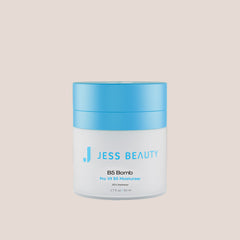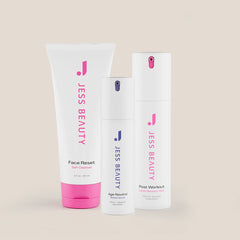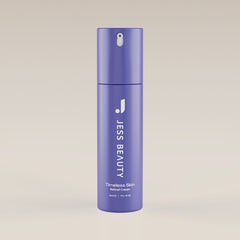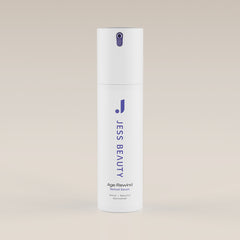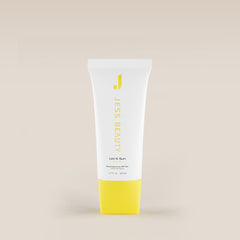Time goes by, and between birthday celebrations and blowing out candles, we suddenly realize we’ve left behind the days of being the dancing queen with 17-year-old skin. Once we hit 25, our skin starts behaving differently. The natural production of collagen and elastin begins to decrease, and with it, the firmness and elasticity of our skin. Does this mean that at 26 we’ll have wrinkles everywhere? Absolutely not! But it is the beginning of a natural process that, if not cared for properly, can accelerate premature aging.
So, to better understand how to keep it healthy and luminous, let’s discover what collagen and elastin do for our skin.
Let’s get to the basics: what is collagen?
Collagen is the most abundant protein in our body, and yes, it’s more important than we often think. It’s responsible for maintaining the structure of our skin and other tissues. Think of it as an invisible scaffold that holds the skin and tissues together, providing firmness and strength. This protein is found in our skin, muscles, bones, and tendons, helping to keep them strong and connected.
Benefits of collagen for the skin:
✓ Firmness and structure: Keeps the skin smooth and wrinkle-free, providing an anti-aging effect and helping combat the first signs of aging.
✓ Hydration: Acts like a sponge, retaining water and preventing the skin from looking dry or dull.
✓ Regeneration: Plays a key role in repairing damaged tissues, which is fundamental for skin renewal.
Where does collagen come from?
Your body can naturally produce collagen by processing dietary proteins into amino acids. These amino acids are essential for the synthesis of different proteins, including collagen.
But where exactly is collagen found in the skin? Most of it is located in the dermis, the middle layer of the skin, which lies between the epidermis and the hypodermis. Here, it integrates into the extracellular matrix, alongside elastin fibers and other components like proteoglycans.
Recommended products to boost collagen production:
When it comes to skincare products that stimulate collagen production, formulations with ingredients like retinol, vitamin C, and panthenol are a must in our routine. Here are two products that can make a notable difference in your nighttime skincare routine:
-
Age Rewind Retinol Serum: This serum helps boost cell renewal and collagen production.
Additionally, it includes niacinamide, which soothes and improves skin tone, and panthenol. It’s perfect for nighttime use and is suitable for all skin types, including sensitive skin.
- Timeless Skin Retinol Cream: This nighttime cream goes a step further by combining retinol with hyaluronic acid and panthenol, delivering an intensive and multifunctional treatment.
What is elastin, and how does it provide elasticity?
Elastin is another key protein in our skin, and although it’s produced in smaller quantities, it’s just as important as collagen. You can think of it like a rubber band: when stretched, it always returns to its original shape without losing elasticity—that’s exactly how elastin works in our skin. Thanks to elastin, our skin can move, stretch, and snap back into shape without losing firmness.
The role of elastin in the skin:
-
Flexibility: Allows the skin to stretch and return to its original shape without breaking.
- Flaccidity Prevention: By maintaining elasticity, the skin looks firmer and younger.
Factors that affect collagen and elastin levels:
Lifestyle:
-
Diet: A diet low in protein and antioxidants negatively affects collagen production.
-
Sun Exposure: UV rays are one of the biggest enemies of collagen and elastin fibers, causing damage that leads to wrinkles and dull-looking skin. We always say this, but SPF is your BFF! No matter the day or season, sunscreen is crucial for your skin care. If you’re looking for a natural finish without a white cast, Let it Sun SPF 50 Sunscreen is perfect for you.
-
Smoking: Tobacco reduces the body’s ability to produce collagen, resulting in faster skin aging.
Natural aging:
As mentioned earlier, starting at 25, the production of collagen and elastin progressively decreases, which means the skin loses firmness and wrinkles begin to form. While this is a natural part of life, a good skincare routine can help slow it down.
Hormonal factors:
Hormonal changes, especially during menopause, can reduce collagen and elastin levels, affecting the appearance and texture of the skin.
Key ingredients that help maintain collagen and elastin levels:
- Retinol: This vitamin A derivative penetrates the skin and promotes cell renewal by increasing the production of new cells in the epidermis.
- Extra: Stimulates fibroblasts in the dermis to produce more collagen, strengthening skin structure and improving elasticity.
-
Benefit: Regular use helps reduce the appearance of fine lines and wrinkles, promoting firmer and more even-textured skin.
- Vitamin C: A powerful antioxidant and essential component in collagen synthesis. It acts as a cofactor in the hydroxylation of proline and lysine, two amino acids necessary for stable collagen formation.
- Extra: Protects the skin from oxidative damage by neutralizing free radicals, , contributing to the preservation of existing collagen and elastin fibers.
-
Benefit: Improves skin firmness, tone, and overall radiance.
-
Provitamin B5 (Panthenol): This essential nutrient is known for its ability to attract and retain water, significantly improving skin hydration and strengthening the skin barrier. Panthenol penetrates the deeper layers of the epidermis, converting into pantothenic acid, which is key for cellular metabolism. This strengthens skin cells and promotes regeneration while soothing irritations and reducing redness.
Our Recommendation: B5 Bomb Pro Vit B5 Moisturizer, with 20% panthenol, soothes, hydrates, and protects even the most sensitive skin.
-
Peptides: These short chains of amino acids act as biological signals, telling the skin when to repair and regenerate its fibers. Some peptides, like copper peptides, not only stimulate collagen and elastin production but also enhance the skin’s barrier function and wound healing.
Peptides work synergistically with other ingredients to enhance rejuvenating effects and improve the skin's resilience against aging.
- Hyaluronic Acid: While it doesn’t directly stimulate collagen production, this compound helps maintain hydration in the extracellular matrix.

